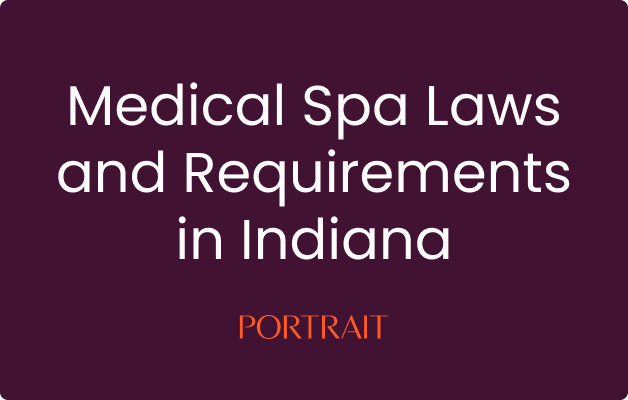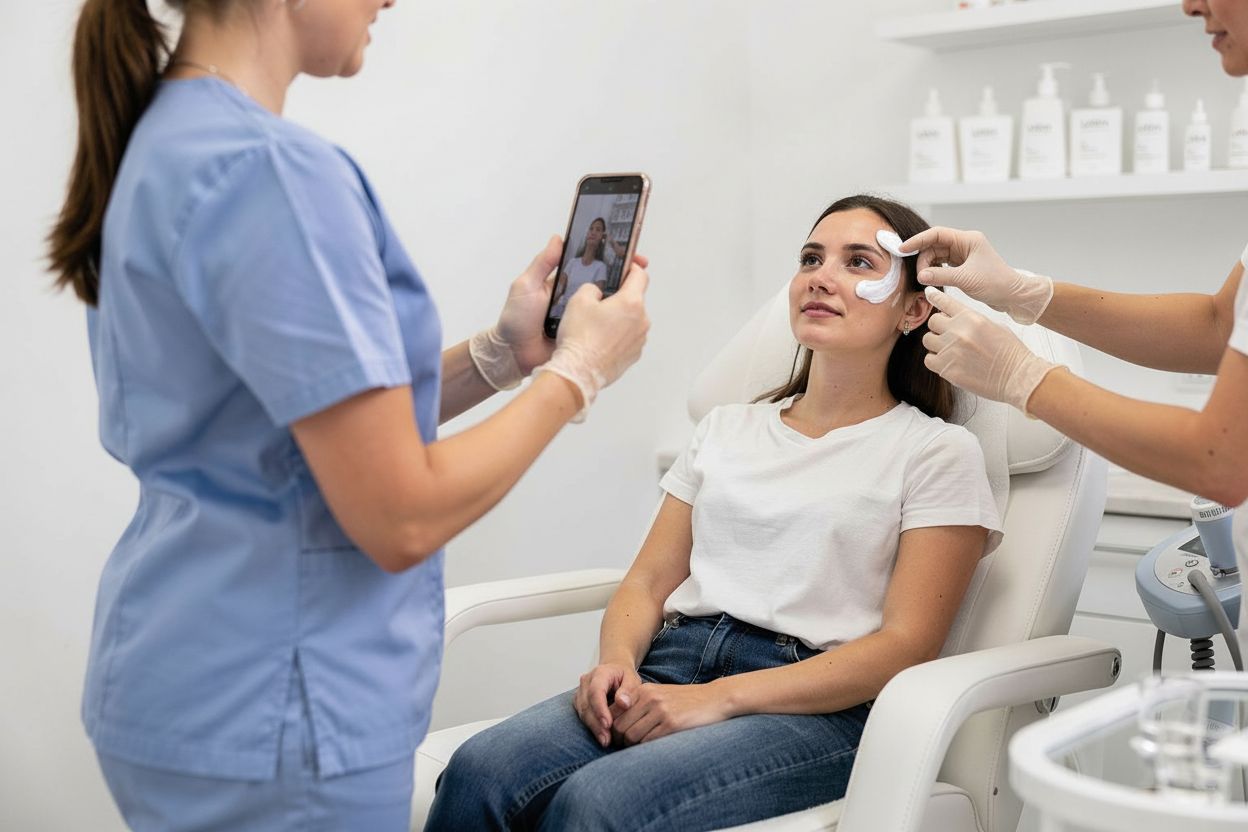Medical Spa Laws and Requirements in Indiana

Empowering Professionals at Every Stage
Portrait offers strategic expertise to help you make informed decisions and achieve long-term success.
Book Intro CallWhile Indiana law does not have a specific statutory definition for a “medical spa,” they are broadly considered licensed healthcare facilities for non-surgical aesthetic procedures. To help you operate with confidence, our guide breaks down the essential state-specific requirements for ownership, licensing, and management.
How Medical Spa Laws Work in Indiana
Indiana's legal code does not offer a specific definition for "medical spa," which can create confusion around med spa laws by state. The key difference from a day spa is that a med spa performs medical procedures, such as injectables, fillers, and laser treatments. This distinction is central to understanding the state's regulatory framework for Spas in Indiana.
Because these services constitute the practice of medicine, med spa regulations are significantly more stringent to protect patient safety. Indiana's prohibition on the corporate practice of medicine (CPOM) is a critical factor that dictates who can own a med spa. This structure ensures that medical judgment guides all clinical operations and med spa compliance.
Consequently, primary oversight comes from medical-focused agencies, not the state's cosmetology board. The main governing bodies include the Indiana Medical Licensing Board and the Indiana State Board of Nursing, which regulate practitioners. Your facility will also need a license from the Department of Health to meet all Medical Spa Requirements Indiana.
Medical Spa Requirements in Indiana
To operate successfully, it's critical to understand the core Medical Spa Requirements Indiana. The state’s prohibition on the corporate practice of medicine is a significant factor, dictating that only a state-licensed physician can own a med spa. Beyond ownership, these med spa regulations extend to practitioner qualifications, collaborative practice agreements for PAs and APRNs, and facility licensing through the department of health. Adhering to these rules ensures total med spa compliance and provides the secure framework you need to grow.
Medical Spa Ownership & Business Structure Requirements in Indiana
Indiana’s medical spa ownership laws are guided by the state’s prohibition on the Corporate Practice of Medicine (CPOM). This legal doctrine dictates that only a state-licensed physician is permitted to own a medical spa. Adhering to this core rule is fundamental for your med spa compliance and is a key aspect of the state's med spa regulations.
While non-physicians cannot directly own the practice, they can participate through a Management Services Organization (MSO) structure. This involves creating a separate company to handle non-clinical operations like marketing and administration for the physician-owned clinic. The law focuses on who can own a med spa, not a specific business entity type for the practice itself.
Furthermore, every facility must have a designated medical director who is a licensed physician. This director must be actively involved in operations, develop a written practice plan, and oversee any collaborative agreements. Indiana law does not impose geographic limitations on who can serve in this critical role.
Facility, Licensing, and Compliance Requirements in Indiana
To meet the Medical Spa Requirements Indiana, your facility must secure a license from the department of health. This is a critical step for med spa compliance and is separate from the individual professional licenses required for all physicians, PAs, and APRNs performing services. These combined licenses form the foundation of the Medical Spa Laws in Indiana.
As medical facilities, Spas in Indiana must adhere to federal OSHA and HIPAA regulations for workplace safety and patient privacy. These standards are part of the broader med spa regulations that ensure patient protection. Your facility must also follow all state health department rules for sanitation and infection control.
Indiana requires med spas to carry malpractice insurance, a standard for all healthcare providers. Additionally, your advertising must be truthful and include practitioner qualifications and treatment risks. Contracts based on false or misleading information are considered unenforceable, making transparent marketing essential.
Who Can Perform Medical Spa Procedures in Indiana?
In Indiana, procedures like injectables, fillers, and laser treatments are legally defined as the practice of medicine. Therefore, only licensed physicians, physician assistants (PAs), and advanced practice registered nurses (APRNs) can perform these services. These Medical Spa Laws in Indiana are distinct from general health spa rules, placing them under the authority of medical licensing boards.
Both PAs and APRNs must operate under a collaborative practice agreement with a delegating physician, which specifies the medical acts they are permitted to perform. A designated medical director must be actively involved in operations, and while remote supervision is possible, the agreement must include provisions for chart reviews. This supervision structure is a core part of the state's med spa regulations.
While specific training mandates are not detailed, delegation is formally managed through the required practice agreements and written plans. It is also important for you to know that while medically necessary procedures are not taxed, cosmetic med spa services are. Following these provider and supervision rules is fundamental to maintaining your med spa compliance.
Laser & Energy Device Regulations in Indiana
Indiana law considers procedures like laser treatments and radiofrequency treatments the practice of medicine, though a specific statutory definition for these devices is not provided. Consequently, only licensed physicians, physician assistants (PAs), or advanced practice registered nurses (APRNs) may perform these services. This rule is a core component of the Medical Spa Laws in Indiana, ensuring clinical oversight and med spa compliance.
Current med spa regulations do not outline specific training or registration requirements for laser operators beyond holding a professional license. Similarly, the state has not established explicit obligations for reporting adverse events related to energy device use. Therefore, general healthcare provider standards, including carrying malpractice insurance and securing informed consent, become the primary guide for meeting Medical Spa Requirements Indiana.
Medical Spa Enforcement, Penalties & Risk Management in Indiana
Understanding the Medical Spa Laws in Indiana is one thing; maintaining med spa compliance is an ongoing commitment. Violations can lead to serious consequences, but with the right approach, you can protect your practice and your patients. State agencies take med spa regulations seriously, and enforcement actions are designed to uphold the integrity of medical practice in Spas in Indiana. If your facility fails to meet the Medical Spa Requirements Indiana, you could face several penalties for illegal med spa operations, ranging from cease-and-desist orders that halt business to significant fines. The Indiana Medical Licensing Board or the Board of Nursing may also initiate disciplinary proceedings against licensed professionals, which could result in license suspension or revocation.
Knowing the common pitfalls is the first step toward avoiding them. Here are some of the most frequent violations we see:
- Improper Delegation: Assigning medical procedures to unqualified staff, such as an aesthetician performing injectables
- False or Misleading Advertising: Making unsubstantiated claims about treatment outcomes or failing to disclose practitioner qualifications
- Unlicensed Practice of Medicine: This often relates to the question of who can own a med spa, as non-physician ownership can be interpreted as the corporate practice of medicine
Proactive risk management is your best defense and is key to how to stay compliant as a med spa in Indiana. We guide our partners to build a strong foundation for med spa compliance with these core practices:
- Regular Compliance Audits: Periodically review your operations against current med spa laws by state, paying close attention to documentation, supervision protocols, and facility standards
- Comprehensive Staff Training: Document training for all team members on their specific roles, HIPAA, OSHA, and your practice’s collaborative agreements
- Detailed Documentation: Maintain clear records of patient consents, treatment plans, chart reviews by the medical director, and all collaborative agreements
Stay Compliant with Portrait Care in Indiana
Staying compliant in Indiana means understanding a few critical rules. A licensed physician must own the practice, all practitioners must hold the proper licenses, and your facility needs a license from the department of health. Furthermore, clear collaborative agreements for PAs and APRNs, along with diligent documentation and regular audits, form the backbone of a secure and successful operation.
While this guide provides a solid overview, it is for informational purposes only and does not constitute legal advice. We strongly encourage you to consult with a qualified healthcare attorney to address your specific circumstances.
Portrait Care provides the technology, services, and support to help you manage compliance and grow your practice with confidence; schedule a demo to see how we can support your clinic. Learn more about opening a compliant med spa.
One Platform.
Everything You Need.
Everything You Need.
Portrait combines the technology, support, and savings to run and scale your modern medical wellness business.
Book Intro Call
Stay Connected with Portrait Care
Subscribe to our email list and receive the latest insights, updates, and exclusive content delivered straight to your inbox.




![Who Can Own a Medical Spa? [State by State Guide]](https://cdn.prod.website-files.com/67981e0672f9e49c5b9cb890/69869b11472946b6ec9fe1f0_1770427418079.jpeg)
